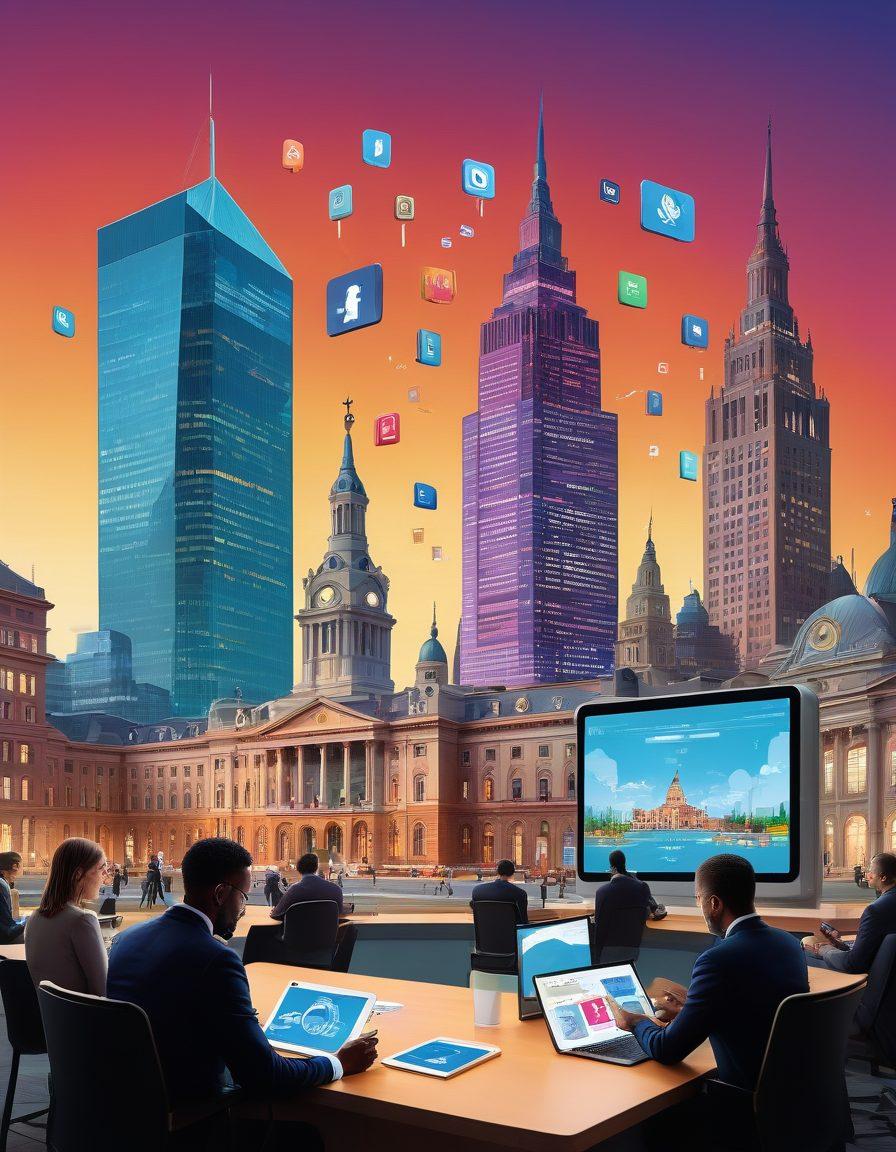Empowering Citizens: How Digital Services Are Transforming Public Communication in the Government Sector
In a world driven by technology, the way we communicate, gather information, and interact with our government has changed forever. The age of digital services is upon us, and it’s revolutionizing governance as we know it. Imagine this: a local government office where citizens no longer stand in long queues, but instead, engage with their representatives from the comfort of their homes using just a few taps on their smartphones. This shift to e-government and online communication is redefining citizen engagement, making it more accessible, efficient, and straightforward. With organizations like Kominfo leading the way, the integration of information and communication technology (ICT) is essential for enhancing public information dissemination and fostering stronger community connections.
As we delve into the relationship between digital services and citizen engagement, it’s essential to recognize the role of telecommunications. The telecom industry, equipped with advanced data services and robust internet services, creates a backbone that supports various online services. This infrastructure enables citizens to access not only the basic services but also engage in government decision-making processes through platforms that allow real-time feedback. Have you ever wondered how your local government can instantly notify you about community events, public health advisories, or emergency situations? The answer lies in utilizing internet and digital technology, ensuring that public information is just a click away.
Moreover, the rise of social media and media services has transformed the landscape of communication between citizens and their governments. Instead of relying solely on traditional press releases or town hall meetings, officials can now reach a broader audience by tapping into popular networking platforms. This shift doesn't just enhance transparency; it fosters trust. Citizens can engage in dialogue, voice their opinions, and share experiences with their government officials in ways that were previously unimaginable. Can you think of a time when a social media post led to a change in your community? That's the power of cyber communication at work!
However, with great power comes great responsibility. While digital services offer unparalleled opportunities for citizen engagement, they also pose challenges. Digital divide issues can leave certain demographics behind, limiting their access to crucial information and services. It’s imperative for governments to ensure that e-government initiatives are inclusive and take into account the varying levels of tech literacy and access among citizens. What strategies would you suggest to bridge this gap and ensure that everyone can benefit from the advantages of digital technology?
In conclusion, the path to revolutionizing governance through digital services is not just about implementing new technologies; it’s about creating a connected community where every citizen feels heard and valued. By integrating advanced web services, improving telecommunications infrastructure, and embracing the full potential of digital information, governments can create a participatory environment that reflects the needs of its people. As we move forward, let's continue to explore how these rich interactions can shape our future, making governance a collaborative endeavor powered by technology and driven by citizen engagement.
From Offline to Online: How Technology is Enhancing Government Communication
In a world where information travels at the speed of light, the shift from offline to online has dramatically altered the landscape of government communication. The days when citizens had to rely on paper notices or long queues at government offices are ebbing away, ushering in the era of digital services. With the help of innovations in information and communication technology (ICT), public communication is becoming more efficient, accessible, and engaging than ever before. This transition not only empowers citizens but also enhances the capabilities of government agencies to serve their constituents effectively. Have you ever wondered how this transformation started, and what it means for the future of e-government?
As we navigate through the complexities of modern society, the role of technology in government communication cannot be overstated. The telecommunications industry is thriving with new advancements, enabling governments to reach their citizens directly through online platforms. By leveraging digital media and social media tools, public information is disseminated in real-time, ensuring that everyone is informed and engaged. According to a notable quote by tech visionary Steve Jobs, "Innovation distinguishes between a leader and a follower." This epitomizes the proactive approach that governments are now taking in utilizing digital technologies to foster better communication.
Imagine waking up to a world where you can access government services from your smartphone with just a few clicks. This isn't a futuristic dream—it’s the current reality for many thanks to digital information and internet services. Traditional communication methods often hindered engagement, but the rise of web services and online communication is bridging the gap between citizens and their government. By transitioning to digital platforms, officials from the Ministry of Communication and Information Technology (Kominfo) are providing seamless communication pathways. But one must ask—how can citizens fully take advantage of these tech services?
Digital transformation goes beyond mere technology adoption; it requires a shift in mindset from both government officials and citizens alike. The government must prioritize transparency and the equitable distribution of information, while citizens should embrace the online tools available to obtain the services they need. Actions speak louder than words, and the digital approach promises to catalyze change in public service delivery. It's crucial to ask ourselves—are we ready to leverage this unprecedented access to information and utilize the digital resources provided by our governments?
The path to enhanced government communication through technology is paved with opportunities for a more engaged citizenry. As e-government continues to evolve, it becomes increasingly essential for both the telecom industry and citizens to adapt to these changes. It's not merely about having access to information; it's about using it to drive improvement and accountability. Whether it’s through networking, data services, or virtual public forums, technology is elevating the standard for government communication. As we venture further into the digital age, let’s commit to being active participants in shaping our democracy—the future of public information is in our hands.
Bridging the Gap: The Impact of Digital Transformation on Public Information Access
In today's fast-paced digital landscape, the way we communicate and access public information has undergone a revolutionary transformation. It seems almost magical to think that just a few clicks can connect citizens with their government. But this isn't sorcery; it's the result of diligent efforts in digital transformation. As the realm of information technology (IT) evolves, the government sector has risen to the challenge, embracing digital services and making public communication more efficient and user-friendly. By bridging the gap with innovative online services, we unlock a treasure trove of information and communication that was once out of reach for many.
Imagine standing in a long queue at a government office, waiting for your turn to obtain crucial information. Frustrating, isn't it? Today, with the power of the internet and telecommunication advancements, those days are fading away. The rise of e-government and digital services has changed how we interact with public institutions—information is now just a few taps away. Whether you're seeking data services, media services, or simply the latest updates from the telecom industry, the reach of the government is now extended through the virtual realm. As the famous author, Steven Johnson, once said, "Innovation doesn’t happen in a vacuum; it happens when users pick up and remix the tools that inventors create."
But with great power comes great responsibility. As this transformation flourishes, it’s crucial to discuss how digital technology can ensure equitable access to information. Not everyone has the same level of internet connectivity, and disparities in access can hinder efforts to promote transparency and engagement. How can we ensure that no citizen is left behind in this digital age? Herein lies the importance of enhancing online communication, from diverse media platforms to fostering robust telecom infrastructure, so that every community can tap into the well of public information. The government’s role becomes paramount in spearheading initiatives that ensure that all citizens, regardless of their background, can benefit from these tech services.
Moreover, the role of social media cannot be overstated. Platforms like Twitter and Facebook have transformed how governments communicate with citizens, opening channels for real-time information, feedback, and interaction. For instance, during a crisis or a national emergency, timely updates via these platforms can save lives. But what happens when misinformation spreads like wildfire in the vast realm of cyber communication? As citizens, we must remain vigilant and discerning, always questioning the sources of the information we consume. By empowering ourselves with media literacy, we can better understand the landscape of digital information offered by our governments and advocate for clarity and accuracy.
Lastly, digital transformation in public communication is not merely a trend; it’s a significant step toward a more connected society. The combination of information technology and communication can lead to a more informed populace, capable of engaging with their government in meaningful ways. Imagine attending virtual town hall meetings from your home or accessing an official document through a simple web service portal. As citizens, it’s vital to embrace these tools to actively participate in our democracy. The connection between citizens and their government, fueled by digital services and the power of information, is a promising avenue toward not only fostering engagement but also rebuilding trust. Isn't it time we step into this digital era together?


